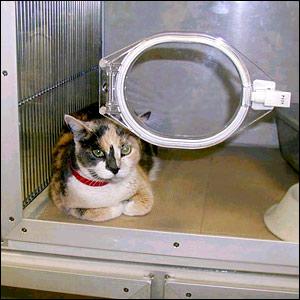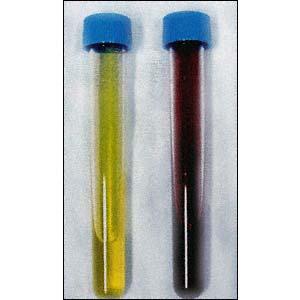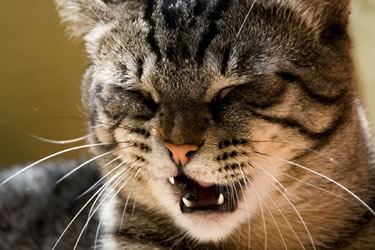If you're a cat lover like me, few things are more important than the good health of your favorite feline. It goes without saying that part of being a cat lover is accepting responsibility for your pet's well-being. That means finding and building a good relationship with a local veterinarian in the event of a medical emergency. It also means learning enough about common health problems to be able to identify them and take the required action to ensure your cat's good health.
One of the most common medical conditions in cats is the hairball. Hairballs are the unintended consequence of a cat's preoccupation with grooming. Because cats clean themselves quite frequently by licking their fur, they invariably ingest some of their own hair. While most of the hair a cat swallows passes through the digestive tract unimpeded, hair can collect in the stomach, where, much like a ball of string, it becomes entwined.
In most cases, cats are able to take care of a hairball on their own simply by vomiting. Hairballs, however, can grow to a size that your cat cannot pass or vomit. When this happens, a hairball can cause a serious and even life-threatening blockage of the digestive tract. Common symptoms include unproductive retching or heaving, a change in eating habits or digestion, or even a swollen abdomen. If you notice symptoms like these, take your cat to the vet right away.
About one-fourth of all digestive blockages in cats are caused by hairballs that can't be passed. Fortunately, an ounce of prevention is worth a pound of cure when it comes to your cat's good health. A prophylactic chat with your veterinarian is definitely in order if your cat is prone to an abnormally high number of hairballs. Your vet may suggest a high fiber diet or prescribe a flavored medication that contains a lubricant to keep hair moving freely through your cat's digestive tract. Taken regularly, meds like these can prevent hairballs from ever forming at all.
A good relationship with a qualified veterinarian is important should your cat ever require professional care for hairballs or other ailments. Regular visits to the vet, even when there's no emergency, can add many years to the life of your favorite feline. Finding a good vet in your area is often as easy as asking a fellow cat owner for a recommendation. If you've recently moved or don't know another cat owner, check your online yellow pages for a list of qualified vets in your neighborhood.

 Feline Leukemia Symptoms – What To Watch Out For?
Accord
Feline Leukemia Symptoms – What To Watch Out For?
Accord
 Bald Spots on Cats
Bald Spots on Cats Bald spots are a common occurrence in cat
Bald Spots on Cats
Bald Spots on Cats Bald spots are a common occurrence in cat
 Dyspnea (Trouble Breathing) in Cats
Dyspnea (Trouble Breathing) in Cats
Dyspnea (Trouble Breathing) in Cats
Dyspnea (Trouble Breathing) in Cats
 Hematuria in Cats
Hematuria (Blood in Urine) in Cats
Hematuria in Cats
Hematuria (Blood in Urine) in Cats
 Sneezing and Nasal Discharge in Cats
Sneezing and Nasal Discharge in Cats
Sneezing and Nasal Discharge in Cats
Sneezing and Nasal Discharge in Cats